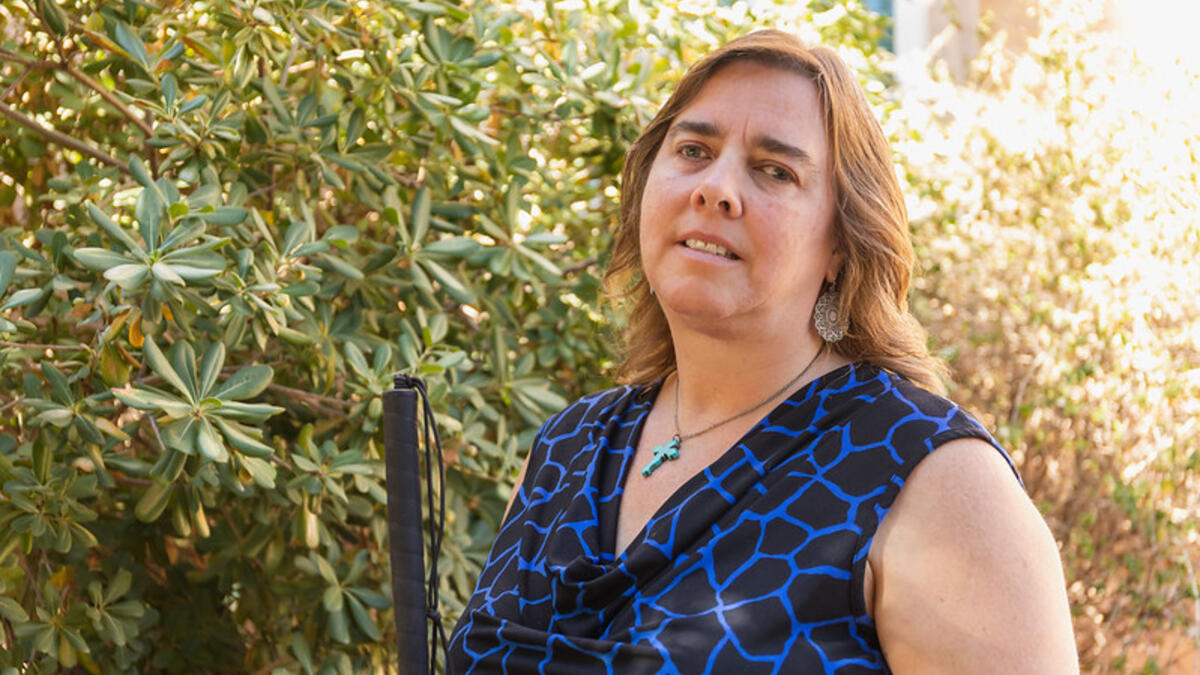ASU grad shares her gift for linguistics with the world

Fall 2019 ASU graduate Melody Taylor.
Editor’s note: This is part of a series of profiles for fall 2019 commencement.
Melody Taylor has made the Disability Resource Center her “home away from home” during her time at Arizona State University. She has also dedicated herself to education, working for the DRC to help students with disabilities be successful and also teaching English to international students and refugees.
Taylor, who is blind, is graduating in December with her degree in linguistics, and she also works as an editor for the DRC’s Alternative Format Services, making sure materials are accurate for students with visual impairment.
“Being able to give back by proofreading the documents for the visually impaired students has been rewarding,” Taylor said.
Taylor was the vice president of Daredevils of ASU, an organization that provides a safe space for students with visual impairment. It is a place for students to share stories, bring awareness and help each other overcome challenges.
“We also met to get stress relief while watching audio-described movies, playing Braille card games and eating good food,” Taylor said.
Taylor appreciates the diversity of language and all the forms that it comes in and said she’s open to what doors will open up for her after graduation. She answered a few questions for ASU Now as she prepares to graduate in December.
Question: What was your “aha” moment when you realized you wanted to study the field you majored in?
Answer: My “aha” moment to study linguistics and become a teacher of refugees and international students came when I was attending SAAVI School for the Blind in Phoenix.
They were helping prepare me to get employment when we realized that everything that inspired me needed an education. So, two of the teachers said that they could see clearly that I was built to teach and I loved people of all cultures, so they suggested that I study language at ASU. This was a perfect fit for me.
Q: What’s something you learned while at ASU — in the classroom or otherwise — that surprised you or changed your perspective?
A: While I’ve been at ASU, I’ve attended many meetings focusing on inclusion and diversity. I have been surprised to learn that individuals from other countries who are learning English don’t desire to be praised for how well they speak our language. Our language isn’t any better than theirs. They love when we are interested in their native language and culture.
I didn’t realize that as I was trying to encourage and praise them, they were actually being turned off or even offended. Now, I know to actively inquire about their language and culture, which I’m fascinated by naturally.
Q: Why did you choose ASU?
A: I chose ASU because I had known several visually impaired students who attended here and had a good experience.
Q: Which professor taught you the most important lesson while at ASU?
A: It is difficult to choose only one professor who taught me the most important lesson at ASU. I would have to say Ruby Macksoud, who has been my professor in several classes during my time in the 4+1 MTESOL program (Master of Teaching English to Speakers of Other Languages). She has taught me how to come out of my comfort zone and see the benefits of pursuing several different facets of teaching English to international students.
During my internships, she’s encouraged me to integrate my blindness into the lessons and curriculum as well as being extremely aware of each student's strengths and weaknesses.
Q: What’s the best piece of advice you’d give to those still in school?
A: I would advise students to never go it alone. Always take professors up on their office hours; always interact with other students to learn from their successes and failures; and absolutely, if they have any form of disability, make the DRC their home away from home.
Q: What was your favorite spot on campus, whether for studying, meeting friends or just thinking about life?
A: My favorite spot on campus, besides the DRC, was the center of the Social Sciences building across from the Matthews Center. They have fountains flowing most of the time; the sound of the water is stress relieving, and it is shady, which keeps the heat down while enjoying the outdoors.
Q: What are your plans after graduation?
A: My plans after graduation remain to be seen. God may open doors for me to teach English in Japan or Jordan. I may help refugees adjust to our language and culture as they enter our country. I may teach English to international students who are overseas through the internet. The sky is the limit.
Q: If someone gave you $40 million to solve one problem on our planet, what would you tackle?
A: If someone gave me $40 million to tackle one problem, I would most definitely develop groups across America who would spread the word about how God created people to love and enjoy each other’s differences. These groups would teach about inclusion and diversity of all kinds: ethnicity, physical, mental and emotional disability, and cultural varieties including celebrations and foods, etc.
Written by Carmen De Alba Cardenas, Sun Devil Storyteller
More Arts, humanities and education

ASU professor's project helps students learn complex topics
One of Arizona State University’s top professors is using her signature research project to improve how college students learn…

Award-winning playwright shares her scriptwriting process with ASU students
Actions speak louder than words. That’s why award-winning playwright Y York is workshopping her latest play, "Becoming…

Exceeding great expectations in downtown Mesa
Anyone visiting downtown Mesa over the past couple of years has a lot to rave about: The bevy of restaurants, unique local shops…

